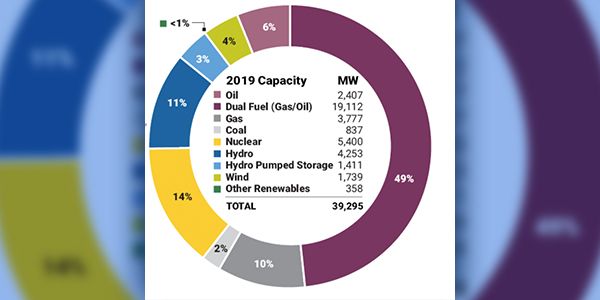NYISO said Wednesday it expects to have adequate resources on hand to meet slightly above-normal demand this summer, with 42,056 MW of capacity available to meet a forecasted peak of 32,382 MW.
The figures show the ISO will far exceed its capacity requirement of 35,002 MW, which includes an operating reserve requirement of 2,620 MW.
“The state’s grid is well-equipped to handle forecasted summer demand,” said Wes Yeomans, NYISO vice president of operations, said in a statement. “We have performed on-site visits of key generating stations to discuss maintenance, testing and adequacy of fuel supplies for hot-weather operations.”
The ISO’s projected summer peak is 1.5% above the 10-year average and outpaces last summer’s actual peak of 31,861 MW recorded on Aug. 29 (and the 2017 peak of 29,677 MW) but is down from the 2018 peak forecast 32,904 MW. Demand topped 31,000 MW on six days last summer.

New York statewide generating capacity by fuel type | NYISO
The peak is calculated to reflect normal summer conditions, but under more extreme weather scenarios peak demand could increase to about 34,186 MW, NYISO estimates. The ISO’s record peak of 33,956 MW occurred in July 2013 at the end of a heat wave.
The total capacity of power resources available to New York this summer include 39,295 MW of generating capacity from in-state power plants, 1,309 MW of demand response resources and 1,452 MW of imports from neighboring regions. The forecast factors in the expected impact of distributed resources and energy efficiency programs.
NYISO staff and the New York Department of Public Service last month informed the state’s Public Service Commission on summer electricity preparedness. (See “Grid Prepared for Summer,” NYPSC Modifies Standby Rates for DERs.) The department forecasts summer energy prices will be down 1 to 3% compared with last year, depending on load zone and weather conditions.
– Michael Kuser



